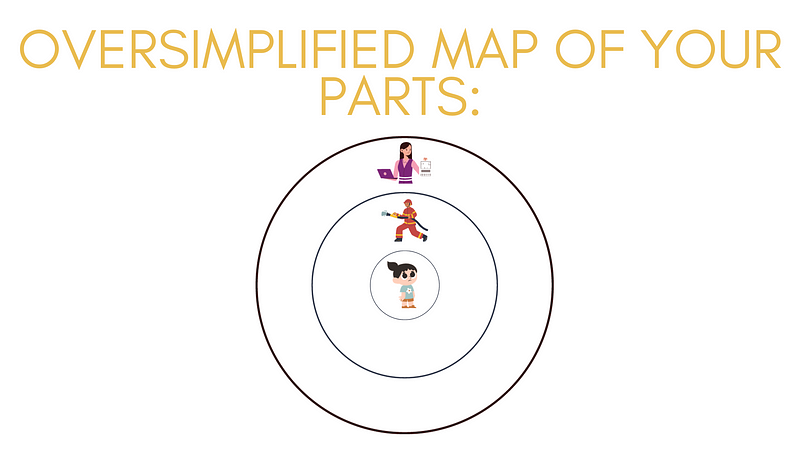Understanding Your Inner Managers: Nurturing Your Protective Parts
Written on
Chapter 1: The Function of Inner Managers
Have you ever found yourself awake at night, your mind racing with worries about what lies ahead? The relentless cycle of planning and anticipating every possible negative outcome can be overwhelming. This phenomenon is often your inner manager parts at work.
In this discussion, we will delve into the vital roles your manager parts play in your psyche and how to offer them some much-needed relief.
The Context of Manager Parts
Previously, I introduced a simplified model of the three types of parts within your inner self: vulnerable parts, managers, and firefighters.

As depicted, your vulnerable parts—holding the raw essence of your pain—are at the core. Surrounding them are your firefighter parts, acting as a buffer against emotional overwhelm. Today, we will focus on the manager parts that operate on the outer edges.
Understanding that manager parts are often preoccupied with future concerns is crucial. Their worries stem from the pain carried by vulnerable parts and the extreme actions of firefighter parts. In essence, manager parts strive to maintain harmony among all inner aspects while protecting against future distress. It's no wonder they often express exhaustion.
Exploring Manager Parts
Manager parts labor tirelessly to shield you from experiences that could reignite the pain of your vulnerable parts. Their mantra is, "Never again." This reflects their determination to prevent further hurt by orchestrating every possible scenario to ensure safety.
These parts are vigilant, setting high expectations for yourself and others. While they can be beneficial, their tendency to become overly controlling or rigid can lead to unnecessary stress. For instance, they may obsess over your public image, fearing criticism that could awaken the vulnerable parts burdened with shame.
Manager parts also exert control over your internal landscape, including your thoughts and emotions. Personally, I can relate to how my manager parts feel as if they are frantically trying to manage the more chaotic aspects of my psyche. Their hyper-awareness can be taxing, yet they persist out of fear that relaxation might unleash overwhelming emotions.
Common Types of Manager Parts
Here are several examples of various manager parts:
- Perfectionist: Strives for flawless execution and sets unattainably high standards, potentially leading to stress and burnout.
- Controller: Seeks to govern situations and others to evade uncertainty, which can strain relationships when taken too far.
- Planner: Organizes and strategizes to ensure smooth operations, but may struggle with adaptability and creative expression.
- Avoider: Evades uncomfortable emotions or situations, which can hinder personal growth and lead to missed opportunities.
- Inner Critic: Preemptively criticizes to shield against outside judgment, often reflecting voices from the past that can perpetuate a cycle of self-doubt.
What Your Manager Parts Desire Most
If there's one message your manager parts wish to convey, it’s simply: "We are tired!" They often express fatigue from their relentless vigilance, fearing that ceasing their efforts could unleash chaos. While their concerns may not be unfounded, it is essential to recognize their exhaustion.
Supporting Your Manager Parts
The pathway to alleviating the stress on your manager parts is twofold:
- Heal Your Vulnerable Parts: The most effective way to ease the burden on your managers is to help your vulnerable parts release their pain. When this occurs, managers can relax their protective efforts.
- Establish Inner Support: By nurturing your Essence as a guiding force, you can reassure your managers that they are not alone in their responsibilities. This can foster cooperation among the various parts rather than conflict.
Reframing the Concept of Ego
Many spiritual teachings suggest that the ego is something to be transcended. However, I propose a different perspective: what if the ego is merely your manager parts striving to keep you safe and loved? Instead of seeking to eliminate these parts, perhaps the goal should be to understand, support, and guide them more effectively.
Preparing to Meet Your First Manager Part
If you're ready to connect with your first manager part, I have a resource that simplifies this process. The "Meet A Part Of You Worksheet" will guide you through identifying and conversing with a part of yourself, providing clarity and insight.
You can download the free worksheet here. Many have found it transformative, so prepare for a profound experience.
More Resources on Parts Work
For additional insights, check out these articles on Parts Work:
- Mapping Your Inner Universe: Discover the three types of parts within you.
- Understanding Parts Work: Learn about the innovative approach to inner ecosystems.
- Compassion for Extreme Parts: Extend kindness to your most intense aspects.
- Uncovering Hidden Parts: Explore powerful methods to reveal your inner self.
- Journey from Self-Harm to Self-Love: A narrative of healing and reclaiming your innocence.
Chapter 2: Embracing the Power of YouTube
The first video, The Question Your Protector NEEDS To Hear || Internal Family Systems Therapy, discusses how to engage with your inner protector in a healing manner.
The second video, IFS for Therapists #6 Working with Protectors, provides insights for therapists on how to effectively work with protective parts within clients.